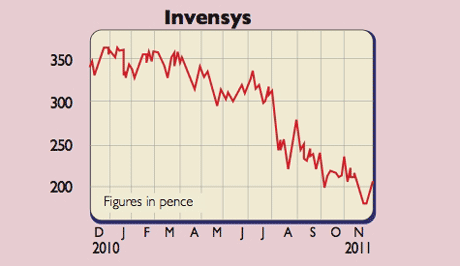
Invensys (LSE: ISYS), rated a BUY by Singer Capital
British motorists waste 123 million hours a year stuck in traffic jams on the way to and from work, according to Churchill Insurance. So it’s little wonder that more people are taking the train instead. As a result, with the railways getting busier, governments are being forced to eke out more capacity from existing infrastructure. This is where Invensys comes in. The company is the world’s third-biggest player in signalling equipment (with an 8% market share) behind Siemens (13%) and Thales (9%).
The company’s advanced kit has been deployed in Britain and overseas to improve track use and deal with growing numbers of passengers. Its rail arm has worked on seven out of eight of the high-speed rail lines in Spain, and on nine out of 12 of Beijing’s metro systems. Revenues at the unit – which accounts for 44% of earnings before interest, tax and amortisation (EBITA) – jumped 7% in the first half of 2011. In September, the order book sat at £884m and was backed up by a £9bn bid pipeline. But since then, this goldmine of a division has bagged another £618m of work.
First there was a £170m contract win in Turkey to supply signalling for a 77km commuter line set to run under the Bosphorus. Then a £28m order came in from Reading’s First Great Western mainline upgrade. Finally, a £420m deal has been struck with the Saudi Railways Organisation to provide technology for the Haramain High-Speed Rail line.
High-speed rail is set to boom
The good news looks set to continue. High-speed rail could prove a goldmine for the industry. China intends to spend $300bn constructing a 25,000km network by 2020. This will connect all its major cities, with trains reaching speeds of up to 350km/h.
The 800km Beijing-to-Shanghai line alone could cost $32bn. The World Bank described the project as “the biggest single planned programme of passenger-rail investment there has ever been in one country”. Invensys is ideally placed to benefit, alongside its Chinese duopoly partner, China South Locomotive.
Meanwhile, in America, California has ambitious plans for high-speed rail projects, and US rail company Amtrak has a $117bn, 30-year vision for a high-speed rail line to span the East Coast. In Britain, the government is seeking to construct a new high-speed line connecting London to the north of England. Similar schemes are also underway in South Korea and India.
So this could be the start of another golden age of train travel. Warren Buffett certainly seems to think so, given his $26bn bet on Burlington Rail in America two years ago. No wonder Invensys chief executive Wayne Edmunds believes the rail arm should be able to deliver growth of “mid to high single digits” and operating margins of 15%-17%.
Invensys also possesses cutting-edge technology and associated software in its operations management division (which accounts for 45% of EBITA). Here it is benefiting from a surge in infrastructure projects coming on stream in emerging markets, especially in the power, oil and gas, nuclear, petrochemical and industrial sectors. The unit has a £1.1bn order book, with £3.9bn of work in the pipeline.
The only slight concern is the smaller controls division (accounting for 11% of EBITA). This makes devices such as thermostats for domestic appliance makers such as Whirlpool. First-half sales fell 16%, although the product range is expected to be refreshed shortly.
The shares are too cheap
The City is forecasting 2011 turnover and underlying earnings per share (EPS) of £2.6bn and 21.6p respectively, rising to £2.7bn and 24.1p in 2012. The shares trade on a price/earnings (p/e) ratio of ten, which is far too cheap for such a technology-rich business. Twelve months ago there were rumours that China’s CSR was stalking the group. If Invensys was able to offload its pension fund to, say, an insurer, it could add more than 150p to the share price.
So what are the possible downsides? A hard landing in emerging markets would hit the firm, since these account for 48% of the order book. Investors also need to keep an eye on foreign currency moves and the £327m pension deficit. I rate Invensys on a ten-times EBITA multiple. Adjusting for minority interests (stakes in subsidiaries held by outside shareholders), retirement obligations and £192m of cash, that generates an intrinsic worth of around 295p a share. Stock broker Singer Capital has a lower target price of 273p. The next trading update is scheduled for 26 January.
Rating: BUY at 210p (market capitalisation £1.7bn)
• Paul Hill also writes a weekly share-tipping newsletter, Precision Guided Investments. See
www.moneyweek.com/PGI
, or phone 020-7633 3634.